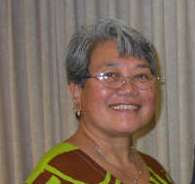Any time a Hawaiian family decides to have a party, it is a family affair. Baby's first birthday party is a momentous one when the family will go all out to put on a great party to celebrate. In the days when infant mortality was very high, survival to the first birthday was a benchmark for the family and that child.
Birthday and wedding parties are always favorite events. Once the word gets around that a party is in the works, then people are called upon to "help" with the party. Sometimes the help may entail going fishing or going to the beach to gather limu (seaweed), or shellfish like the 'opihi, or catching crabs ('a'ama), or gathering sea urchin (wana). For the farmers in the family, gathering taro leaves (luau), taro corm (kalo) or fern shoots would also be the assigned tasks. In the old days, the kalo would be pounded into poi. Favorite desserts are coconut pudding (haupia), and kulolo (coconut and kalo steamed pudding). People who raise animals may be asked to donate a pig (pua'a) to roast (kalua) or beef (pipi) to smoke into jerky (pipikaula).
The best parties are thrown by people from Hana, Maui because they often serve opae (freshwater shrimp).
When a party is planned, most of the invitations are given by word of mouth. "Eh, we going have baby's birthday party, Saturday, about 5:00 at our house." No RSVPs, no written invitations, and no keeping track of who asked whom. Therefore, making sure that there is enough food is a critical requirement. If you think 30 people are coming, prepare for 50-75 guests. Your really good friends will bring goodies such as dessert, beer, ice, dried fish, etc. without being asked.
My husband recently celebrated his birthday party. Being from Ohio, he has his own ideas of what constitutes a birthday party. Weeks prior to his birthday, I began to inquire..."So, what you like do for your birthday?" He answers were often..."I don't know," "Haven't thought about it." "Anything." So I had to get aggressive and try to pin him down with a list of options...what you like eat, who you like invite, where shall we go? His answers were..."I don't know," "Haven't thought about it." "Anything." Getting desperate as the date was nearing, I had to get pushy. "Brah,...what you like do...for real, now." Finally, he answers..."Let's just have a get-together with the family. That's enough for me."
Shoots!! A picnic dinner at the beach was determined. The word was sent out. Steaks were marinated, my super duper potato salad was prepared, our appetizers (pupus) included deviled eggs, veggies with dip, and cold beer and Aloha Maid juices. Rounding off the meal was Redondo Dinner Franks (oh yes, those delicious, fat ones with red dye), rice, loads of lettuces to wrap the barbequed meat with rice and kochujang (Korean pepper paste). To top off the meal was a chocolate birthday cake from KTA SuperMarket.
The day was sunny and cool. The ocean was inviting although the water at Leleiwi and Waiuli Beach parks are super cold due to fresh water springs. Paddle boarders were catching waves on the small surf. Children laughing and playing in the water while the charcoal briquets were turning white on the grill. It was all good. He had his birthday party his way...with the family enjoying the time together and that's what it's all about.
Friday, July 22, 2011
Friday, July 8, 2011
The Hawaiian View of Marriage
In the Hawaiian culture, family is a very important component. Yet the forms of marriage could take various forms. There could be one man and more than one wife. There could be one woman and more than one husband. The children born into these families are loved and cared for by all the parents involved.
For people who were unable to take care of their own children, the parents shared their children with family members in the hanai system. The children were loved and cared for despite their hanai status. The biological parents would often still keep in touch with the children.
When looking at the status of each gender, each was considered equal although each gender had its specific responsibilities. The men did the heavy cooking like pounding the taro to make poi, the staple food for the families or making the imu. The women gathered seaweed and vegetable shoots. In the old days, men ate separately from the women. Certain foods were taboo for the women to eat. Later, Hawaiian ali'i or royalty disbanded such taboo to equalize the status of men and women.
For people who were unable to take care of their own children, the parents shared their children with family members in the hanai system. The children were loved and cared for despite their hanai status. The biological parents would often still keep in touch with the children.
When looking at the status of each gender, each was considered equal although each gender had its specific responsibilities. The men did the heavy cooking like pounding the taro to make poi, the staple food for the families or making the imu. The women gathered seaweed and vegetable shoots. In the old days, men ate separately from the women. Certain foods were taboo for the women to eat. Later, Hawaiian ali'i or royalty disbanded such taboo to equalize the status of men and women.
Kanaka Thinking - Marriage
Awaiaulu ke aloha. Pukui 245
Marriage - Love made fast by typing together.
Good definition for marriage where two people join forces, each keeping his/her own personality, and yet when working to create ties that bind create a new entity that is stronger than the individual's contribution.
Marriage - Love made fast by typing together.
Good definition for marriage where two people join forces, each keeping his/her own personality, and yet when working to create ties that bind create a new entity that is stronger than the individual's contribution.
Subscribe to:
Posts (Atom)
